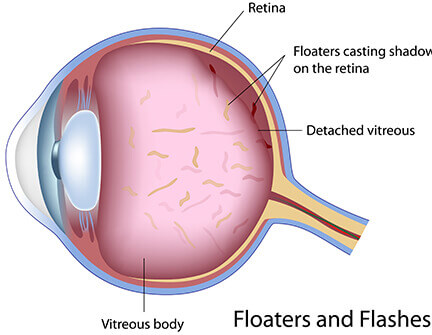 Floaters, sometimes called spots, are small, and semitransparent or cloudy particles that float within the vitreous, the clear, jelly-like fluid that fills the inner portion of your eyes. Floaters are usually harmless.
Floaters, sometimes called spots, are small, and semitransparent or cloudy particles that float within the vitreous, the clear, jelly-like fluid that fills the inner portion of your eyes. Floaters are usually harmless.
Floaters generally look like translucent specks of various shapes or sizes or like cobwebs. They are frequently visible when you are looking at plain lighted background like a blank wall, a blue sky or the white pages of a book or computer screen.
Floaters become visible when they fall within the line of sight and cast a shadow on the retina (the light sensitive portion of the back of the eye). There are a number of possible causes for floaters. They may be small flecks of protein or other matter that are trapped during the formation of your eyes before birth and remains suspended in the clear fluid of the vitreous. Deterioration of the vitreous fluid may also cause floaters to develop. This can be part of the natural aging process and is often not serious, though it can be very annoying. And, certain eye diseases or injuries can cause floaters. It is not uncommon to see floaters after cataract surgery or Yag laser capsulotomy but usually resolve with a few days to weeks of the procedure. If symptoms worsen or progress immediate scheduling for a dilated fundus evaluation by your optometrist should be taken.
Sometimes flashes or streaks of light may appear. This may be happening because the jelly-like vitreous is shrinking and pulling the retina. The retinal receptor cells are stimulated and cause the perception of light flashes. Vitreous shrinkage can continue and result in a part of the vitreous actually to detach from the optic nerve or peripheral retina. Flashes, floaters and vitreous detachment are common and only infrequently lead to serious eye complications.
On rare occasions, vitreous detachments can cause small tears, breaks or holes in the retina. The damaged part of the retina subsequently does not work properly and a blind or blurred spot in vision results. If untreated, retinal tears or holes can continue to worsen and severe vision loss can result if the retina becomes detached.
While flashes and floaters can be symptoms or signs of either vitreous detachments or retinal detachment. If you have sustained closed head trauma or experience an increase in flashing lights with blurred vision, immediate attention should be taken.
During a comprehensive eye examination, your optometrist can use special instrumentation to look at the vitreous, retina and other parts of your eyes to determine the causes of the flashes and floaters that you see.


